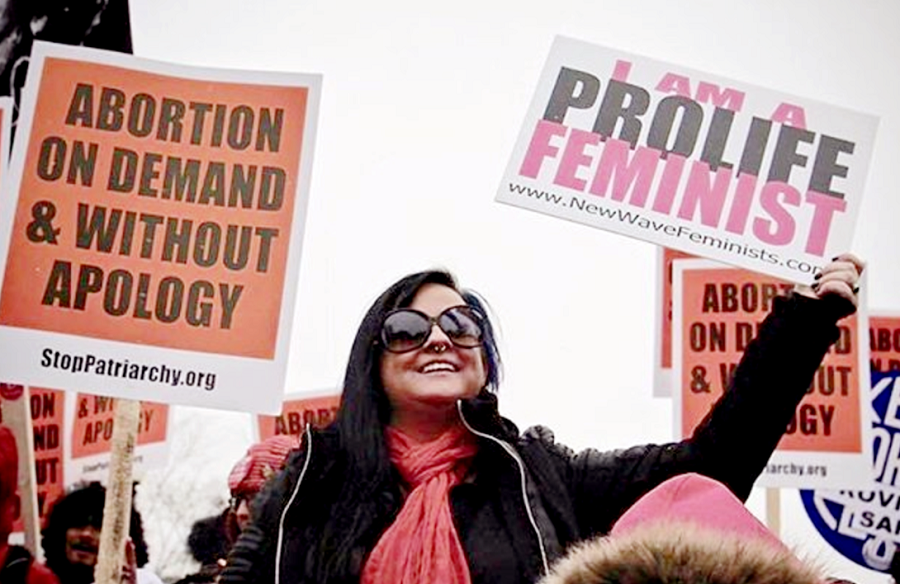The limits of inclusivity: is it possible to be pro-life and feminist?
Members of New Wave Feminists, a pro-life feminist group, participating in the March for Life 2016. The group was removed from the list of partners for the Jan. 21 Women’s March on Washington. Photo courtesy New Wave Feminists.
March 7, 2017
“Her body, her choice,” chanted the men in the crowd of the Women’s March on Washington Jan. 21.
“My body, my choice,” thousands of women and I shouted in response.
At the time, it didn’t occur to me that this refrain was anything but a unifying chant. Since then, I have realized that this pro-choice chant also had the power to divide.
I haven’t been alone in this time of reflection. For many, the march highlighted an uncomfortable dissonance between the feminist movement and the pro-life ideology.
Just before the march, two pro-life, feminist groups—the Texas-based New Wave Feminists and the national anti-abortion organization And Then There Were None—were included on the official list of partner organizations.
Social media exploded with criticism. “Inclusivity is not about bolstering those who harm us,” tweeted feminist author Jessica Valenti.
Soon, both groups’ listings were removed and organizers apologized for their “error.” They published a platform calling for “open access to safe, legal, affordable abortion and birth control for all people.”
This response left me conflicted—and honestly, confused.
To be clear, I believe in reproductive freedom for all. I’m as pro-choice as they come, and proud of it.
But inclusivity can’t be an error. To me, the thought of alienating other feminists is just as objectionable as the thought of limiting another woman’s autonomy.
Still, that mindset begs the essential question: Is it possible to be a pro-life feminist?
Above all—outside a few charged, isolating issues—both pro-life and pro-choice feminists are working toward gender equality.
Many women say they identify as such: New Wave Feminists members are not just pro-life women and feminists, but “feminists, first and foremost,” the organization’s president told The Atlantic.
Others, like Valenti, have claimed that the two movements are incompatible: the goals of pro-life individuals run counter to a feminist politics of complete gender equality and total bodily autonomy.
But access to abortion is one of the few objectives that the movements don’t share. Like feminists, pro-life advocates support fair legal protections for pregnant women and mothers, equal compensation for equal work, paid family leave and an end to domestic violence.
Some, like New Wave Feminists, say they believe that the need for abortion is a result of women’s oppression: Society’s hostility toward women and mothers—from issues of respect to the negative impact of childbearing on a woman’s career—drives women to have abortions. As a result, New Wave Feminists works to make abortion “unthinkable and unnecessary,” rather than illegal.
I don’t agree with this philosophy. But after visiting their website and reading their platform, all with an open mind, I find it impossible to conclude that these strong, smart, passionate women aren’t feminists. I find it even harder to conclude that I don’t want these women on our side.
And the movement’s uncompromising stance on abortion does alienate women who might otherwise be feminists: in a recent speech at the Conservative Political Action Conference, President Trump’s advisor Kellyanne Conway explained that she can’t identify as a feminist because modern feminism is “pro-abortion” and she is not.
But the feminist movement is not the same as the pro-choice movement.
Feminism is a movement based on the fundamental equality of the sexes. Some women believe that abortion access is an essential aspect of equality; others believe that in an equal world, abortion would be obsolete. Above all—outside a few charged, isolating issues—both pro-life and pro-choice feminists are working toward gender equality.
That egalitarian vision is still a long way off. To achieve it, we must work together and include feminists of all kinds by focusing on the ideals we share rather than the one’s we don’t.









asdfawer • Mar 9, 2017 at 8:21 pm
Great, thoughtful and balanced article- all credit to Camille on a brilliant piece
Cathy • Mar 7, 2017 at 10:38 pm
Kudos to the author for addressing a difficult, divisive topic so thoughtfully. Very impressive.